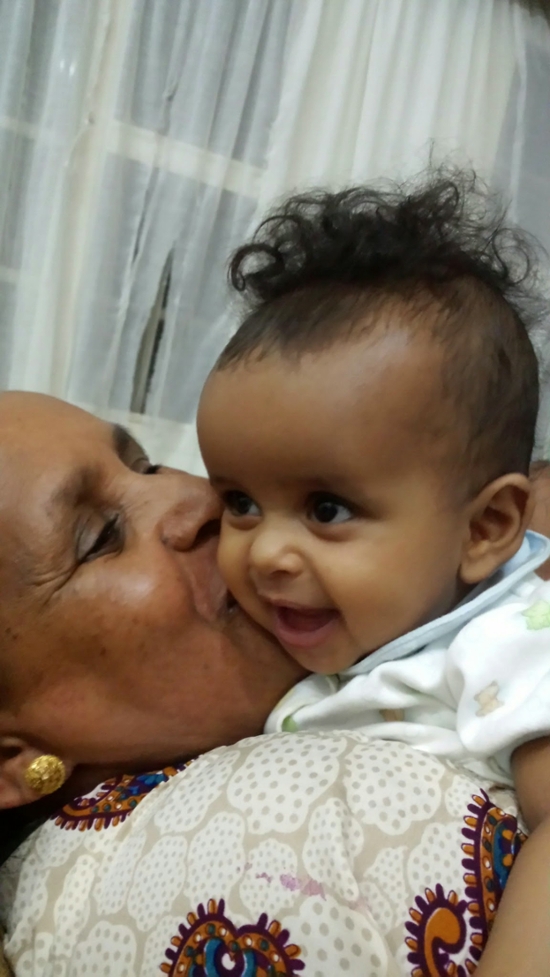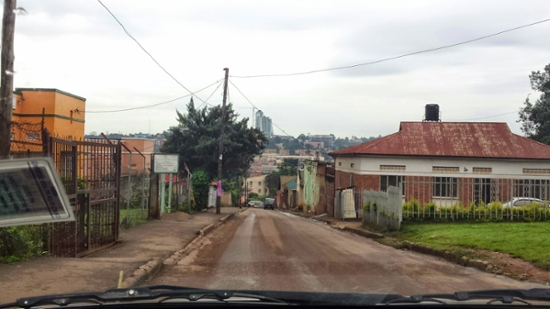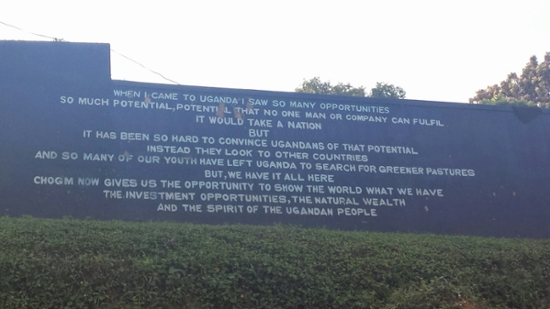Slim to None: the Eritrean Exodus: Part 1

Grandma meets grandbaby for the first time!
Quoting from Winta's President's Summer Fellowship proposal: This summer, I will make a film about this tragedy and the plight of the Eritrean refugees in general. I will interview Eritrean refugees in Uganda, Italy, and the United States. Being an Eritrean immigrant myself, I will explore the diaspora within my own family and demonstrate how film can be a medium for promoting social justice.
Last October, a boat holding 350+ Eritrean refugees capsized off the coast of Italy and rocked the Eritrean community, forcing me to confront questions about who I am and where I come from. While the basic story is that conditions inside of Eritrea are so terrible (indefinite mandatory military service, extrajudicial killings, president turned dictator, etc.) that people will risk everything to flee, I wanted to hear first-hand accounts of what was actually happening. I also aimed to gather first-hand accounts of what happened in Lampedusa when that boat carrying over 350 Eritrean asylum seekers capsized. Among other specifics of the event, I wanted to know if there were Italian witness who didn’t help the drowning Eritreans (as some news outlets have reported) and what effect that has had in the Italian political scene. Most importantly, I wanted to be able to share the stories I encountered with a much broader audience to finally illuminate tales of the Eritrean exodus.
As I was preparing to go to Uganda, it occurred to me that indefinite mandatory military service, the main complaint about Eritrea, is also the reason my family has been torn apart. Because my three older siblings were older than sixteen when my mom decided to move us to the U.S., the Eritrean government refused to grant them exit visas because they hadn’t satisfied their national duty requirements. After ten years of forced service, my brother decided to flee and is now a refugee. While I originally intended for him to be only my contact for gathering others’ stories, I realized ours was just as interesting and seemed key for exploring my own relationship with these issues. As such, Uganda also became the location of a family reunion. After fifteen years, I would be reintroduced to my older siblings; my mom would see her kids again and be introduced to two of her grandchildren; and, I would capture all of this on video to humanize the effects of the current Eritrean crisis.
Within minutes of arriving into the humid Ugandan airport, I knew I was in for the most challenging adventure of my life. While in line for visas, the whole airport became pitch BLACK and a siren sounded off. I thought for sure we were on lockdown and became panicked, only to find out it was a power outage, which happens frequently. Shaken up, I approach the Visa Officers and hand over my U.S. passport. They ask if I was really born in Eritrea and giggle amongst themselves. One officer asks me to step aside while the other tells him to just stamp my passport. After some back and forth, I ask about the issue only to get thoroughly ignored.
After I finally get my visa, I stop to talk with my mom about how we will shoot the reunion scene. Stopping to talk in the small airport was considered suspicious behavior and guards with the biggest guns I have ever seen in my life were quickly approaching us. Since video taping without a press permit (which can only be acquired once in the country) is illegal, we refrained from taking out our equipment and instead dashed toward the exit.
Right outside the door was my brother looking at me with so much joy, disbelief, and grief in his eyes. In that moment, I forgot about how intimidating and scary the airport had been and we started bawling before even making contact. Looking at my brother whose sunken body frame was truly shocking made me realize how urgent and devastating the effects of being a refugee are. In that moment, I felt like I could understand why someone would rather cross the Sahara, then get on a boat and try to make it to Italy than stay a refugee forever.
Over the next few days I learned a lot about the strange relationship between Eritreans and Ugandans. Eritreans come to Uganda because it is one of the safest regions in the country, but the two groups of people almost never interact socially. Eritreans tend to live and work together, to which Ugandans take great offense. The stereotype of Eritreans in Uganda is also that they are the “richest” refugee population in the area. As such, Eritreans routinely get extorted at every turn and are charged higher prices for everything. When I told everyone about my strange airport experience, they laughed and said the officers must have been unsure about extorting me since I am both Eritrean and American. According to them, the officers would have been much nicer if I had given them a few extra dollars. In the next few weeks, I found this to be true--when Ugandan officials knew I was Eritrean, I had to pay more to get routine things accomplished. The only exception was in the refugee camp, which I will write about in the next blog.


Tags: psf, presidents summer fellowship, eritrea, uganda
